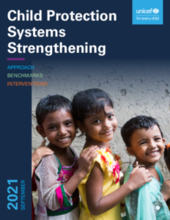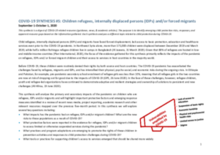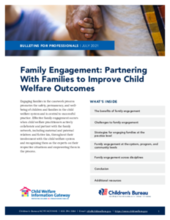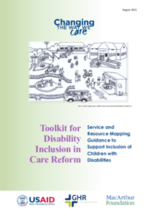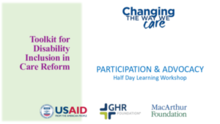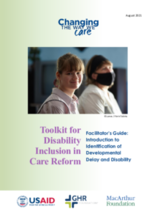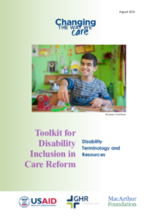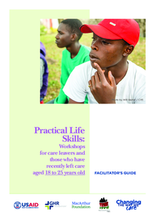Displaying 951 - 960 of 4424
Guided by UNICEF’s Child Protection Strategy (2021 – 2030) which provides the overarching strategic framework for UNICEF’s child protection programming globally, the paper discusses key considerations that have shaped this approach.
The purpose of this evidence synthesis is to analyze the primary and secondary impacts of the pandemic on children who are refugees, IDPs and/or migrants and highlights important protective factors and emerging response measures identified in a review of recent news media, project reporting, academic research and other relevant resources mapped over the previous five-month period.
Engaging families in the casework process promotes the safety, permanency, and well-being of children and families in the child welfare system and is central to successful practice. Effective family engagement occurs when child welfare practitioners actively collaborate and partner with the family network, including maternal and paternal relatives and fictive kin, throughout their involvement with the child welfare system and recognizing them as the experts on their respective situations. This bulletin for professionals provides an overview of the foundational elements of the family engagement approach, followed by strategies and promising practices for implementing it.
In this document, the awareness raising and advocacy is on behalf of or to benefit children with disabilities—many of whom may struggle to communicate because of their disability or whose voices are not heard—and because adults, systems and services often do not consider the opinions of children and children with disabilities are often left behind in changing or improving systems of care.
This guidance specifically refers to mapping of services as the process of locating and sharing information to a wide range of people about available services to support children with disabilities and their families.
This is a presentation for a half-day workshop on participation and self-advocacy approaches for working with children with disabilities and their families; includes slides, facilitation notes and a sample list of country-specific disability rights.
This facilitator’s guide accompanies the workshop slides by the same title, 'Introduction to the Identification of Developmental Delay and Disability' as part of the Toolkit for Disability Inclusion in Care Reform. It is designed to be used by the person providing the workshop.
The terminology and tips that follow may help as you use the Toolkit for Disability Inclusion in Care Reform and apply its principles to your program activities. It is recommended that you become familiar with these terms before reading the rest of the content and revisit as needed. Please keep in mind that disability is an evolving concept. Language that is preferred in one context may be different in another. Ask local organizations of persons with disabilities (OPDs) for the preferred terms in your language and country text.
This participants handbook has come into being by care leavers for care leavers. It has been developed based on the myriad of challenges shared and experienced by care leavers, hoping with the hope that it will support others leaving care.
This series of resources are designed by care leavers for care leavers to help equip youth for life outside of care, strengthen coping strategies, foster safety nets and community networks. It builds from earlier life skills work that the Kenyan Society of Care Leavers has done, supported by Changing the Way We Care with global best practices.

